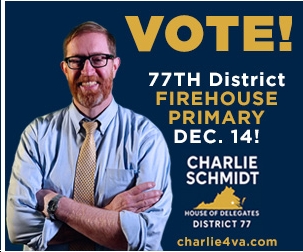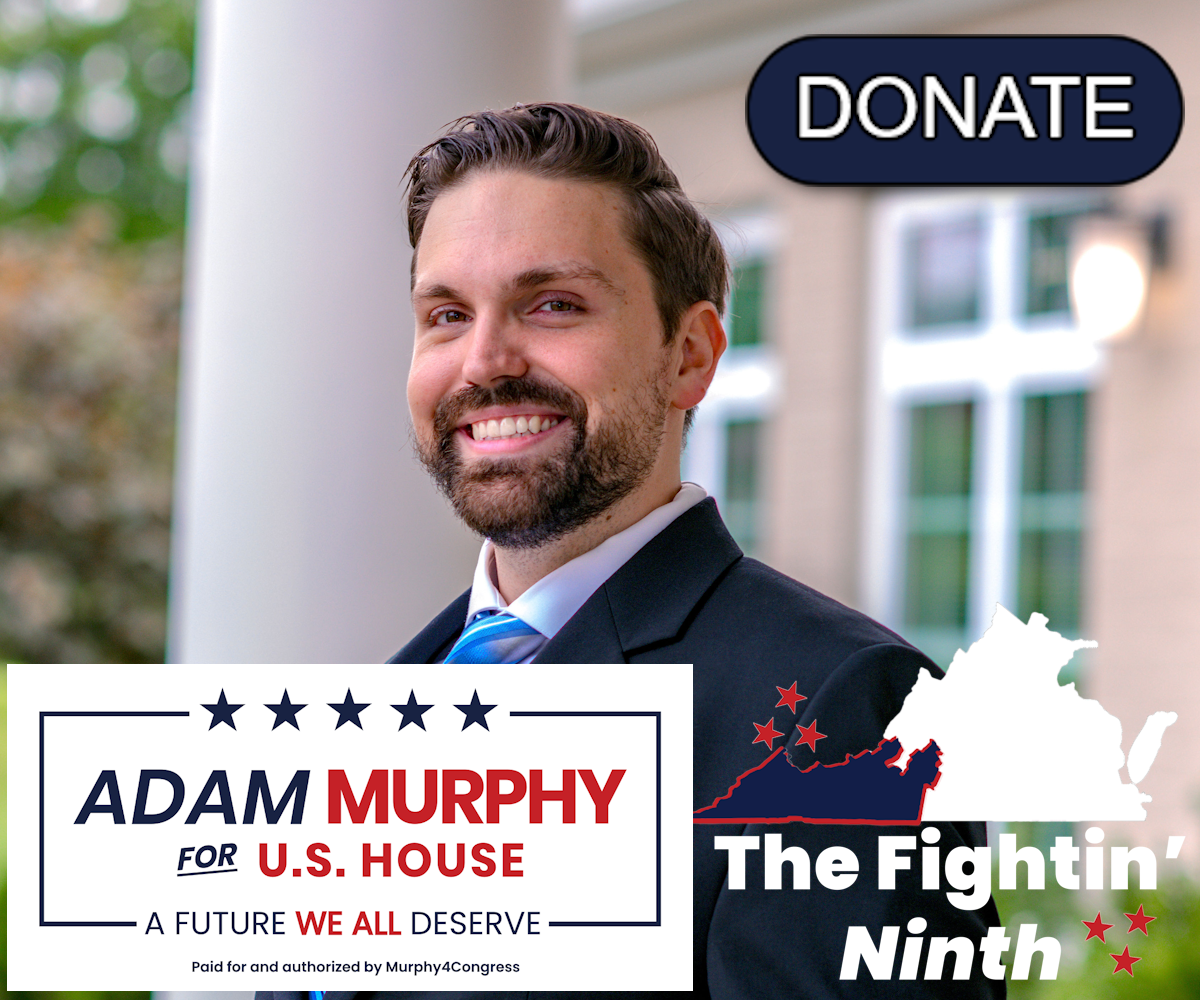I had a chance to sit down yesterday with Sam Bleicher, an adjunct professor of law at Georgetown University in Washington, D.C., and a strong environmentalist, who was a member and vice chair of the Virginia Air Pollution Control Board from June 2014 to November 2018, when he was removed by Gov. Northam “less than a week after they raised concerns about a natural gas compressor station planned for a historic black community in Buckingham County and ahead of the board’s vote on the project.” Yeah, I know…what was *that* all about???
What spurred our meeting was that Bleicher is now out with an excellent new novel, “The Plot to Cool the Planet,” which we discussed for a while. I’ll post about that separately in the next couple days. After talking about his book, we then proceeded to a lengthy discussion about Virginia environmental issues, particularly the fracked-gas pipelines, Bleicher’s service on and dismissal from the Air Board, the Union Hill compressor station issue, Dominion Energy, DEQ director David Paylor, environmental racism, etc, etc. By the way, many of the questions I asked Bleicher were “crowdsourced” from folks I respect in the anti-pipeline community. See below for highlights from that part of our discussion…lots of interesting comments by Bleicher, IMHO.
- According to Bleicher: “The Air Pollution Control Board did not have regulations that provided authority over the pipeline; the vote at the Air Pollution Control Board was about the siting of the compressor station at Union Hill. And I probably would have voted against that. There was an argument, there were some internal Board Member views that you know, you’re depriving this poor community of a half million dollars worth of benefits and maybe they’re better off with the money. If we’re really worried, if the whole issue is about whether the community is better off, maybe they’re better off with a half million dollars. Maybe not, but that’s at least a respectable argument.”
- In contrast, Bleicher believes that there’s no respectable argument for the Atlantic Coast Pipeline (ACP). Among other problems, Bleicher believes it’s “ridiculously expensive,” “the rate of return that [Dominion has] been promised has no economic rationale to it at all unless you want to subsidize pipelines.”Bleicher added, “Look at this from Dominion’s point of view; they’ve got this big windfall tax benefit from the tax bill, they’ve got a lot of cash. ‘What are we going to do with it? Well, let’s build a pipeline; we have a guaranteed 14 percent rate of return.’ ”
- So why would anyone other than Dominion Energy and its shareholders go along with this unnecessary project? According to Bleicher, he doesn’t know for sure, but “Dominion has persuaded all the economic development type people in all the counties that the pipeline is going through that they will benefit, because they will have access to natural gas from the pipeline…I’m not even sure that’s true,” but the claim (by Dominion, Terry McAuliffe, Ralph Northam, etc.) is that it will “attract industry.”
- According to Bleicher, one of the reasons why the ACP is designed to have a compressor station in Union Hill is that it’s basically at the intersection of the ACP and the existing Transcontinental Pipeline…”if they put the compressor station there, they can service the new pipeline to the east using the natural gas from the Transco pipeline if they don’t ever get the fracking or if the fracking doesn’t produce as much gas for as long as they hope…so that’s why that location [was chosen].”
- I asked whether he thought Union Hill was selected because of environmental racism. Bleicher responded, “I wouldn’t go that far, I’ll just say they were completely tone-deaf to the whole subject…They weren’t going to let the nature of the community stand in the way of what was economically sound…One person on the board said to me at one point, ‘you know, Dominion’s mistake was they could have put this a mile and a half down the road.’” So they could have largely avoided all this controversy if they had just put the compressor station a few miles away, but “they didn’t see the controversy coming, they just weren’t in tune with the public sentiment.”
- Did Dominion target Union Hill in any way? Bleicher responded, “On the contrary…[I think Dominion’s attitude was] this has nothing to do with people, we’re just putting it where it’s most efficient…mostly they sat down with a map and drew a line and said this is the place to put it.”
- Bleicher added that there’s little question that Dominion tries to avoid putting infrastructure in places where there would be a great deal of political opposition. But Dominion didn’t think it would have that problem in Union Hill. Buckingham County’s Board of Supervisors bad approved the project.
- Regarding the authority of the Air Board, Bleicher said that the Air Board has no regulations and has never asserted jurisdiction regarding regulating methane emissions in state or out of state. There is now a task force now studying how to adopt methane regulations in Virginia.
- Bleicher added that, with regard to regulating methane emissions, DEQ could try to “flex its muscles and try to do that,” but “the governor doesn’t want…it to interfere with the pipeline, that’s clear…Dominion wanted one thing from the governor, and what’s he going to say, ‘no, I’m not going to give you the one thing you want?’ That’s hard to do. That’s hard to do. And especially it was hard for McAuliffe seven years ago now…there wasn’t a legislator who wasn’t taking contributions from Dominion, and you weren’t going to get anything else done.”
- So does Dominion control the legislature? Bleicher said it’s not black and white these days, that Dominion “has problems” and is not all powerful.
- Do Air Board members have expertise on these issues? According to Bleicher, some do but some absolutely don’t. For instance, one member was a real estate developer who didn’t even understand what the problem was with methane or carbon pollution. Instead, these are citizen boards; “DEQ is the experts.” “In the four years that I was on the board, we didn’t once vote against DEQ’s recommendation, except on the carbon rule, which was a slightly different situation [because it wasn’t in response to Federal requirements]…we offered some minor amendments…small changes.”
- Is DEQ actually trying to protect the environment or are they “captured” by industry? According to Bleicher, the answer is “somewhere in between…they worry about their budget…those appropriations have been threatened…they don’t have enough inspectors…”
- How does Bleicher view DEQ head David Paylor? “First and foremost, [David Paylor]’s a bureaucrat; he wants to keep his budget, he doesn’t want to alienate legislators. He said to me on several occasions, ‘I have two bosses, I have the governor and the Air Board, when they don’t agree I’ve got a problem’…until recently, we haven’t even come close to having an environmentalist legislature, so in some sense he’s never been tested…I don’t think he’s passionate [about the environment] at this point.”
- On the role of the Attorney General’s office in discussions by the Air Board, Bleicher said the AG’s representative “hardly said a word ever, but when asked he was very helpful.”
- I noted that there are people opposed to the pipelines who are very suspicious about the AG office’s role. According to Bleicher, the AG’s office absolutely did not play a nefarious role, that AG Herring “has done a lot of good work for the environment,” and that the AG’s office “can’t put their opinions ahead of the Board…basically they’re there to help…I don’t think they thought it was their job to be pro-pipeline or anti-pipeline or compressor station…[their job was] to provide support, and if you asked for their help, they’d give it.”
- So what happened exactly when the Board went into closed session? Bleicher said “they might be consulting with counsel about what they can do and what they can’t do…they have to vote and they have questions about their authority…They weren’t supposed to be deciding about the pipeline, this is about the compressor station, this is a different question…”
- What would killing the compressor station have done exactly? Bleicher said “it’s hard to know…Dominion might have sued…or Dominion [might have said] we’ll move it a mile down the road.”
- If the compressor station had been killed, would it have also killed the pipeline? Bleicher: “There’s no reason to think that’s true…I made it very clear…my views on the pipeline were irrelevant to this decision…this was a decision about the compressor station…We don’t have any clear policy about environmental justice issues…We don’t even know how we’d measure environmental justice, we have no criteria for that…does that mean no industry can ever move into Union Hill?”
- Is there any reason to think that the Air Board was “strong armed?” According to Bleicher, that definitely didn’t happen to me when I was there – “nobody said to me, ‘you better vote this way’.”
- Why exactly was Bleicher removed from the Board? “The Secretary of the Commonwealth’s Office called me up and said, ‘thank you for your service, we no longer need you on the Board’…I think the governor’s office made the decision…Dominion was concerned that they weren’t going to win if six people were voting. If Rebecca Rubin and I were there [Dominion might have lost the vote on the compressor station].”
- Bleicher said he had applied for reappointment to the Board months earlier, and the assumption in the environmental community was that he’d definitely be reappointed after all the support they gave to help elect Northam.
- Is there any reason to believe that Northam and/or his Chief of Staff were directly involved in this? Bleicher said “I don’t think it could have been routine…somebody decided to do it…It looks like it was done at Dominion’s behest…My impression is that DEQ was not involved in that decision…I thought they were maybe even surprised.”
- Should the Air Board consider things like environmental justice in citing facilities like the compressor station? According to Bleicher, “yes, the law calls for it, but there isn’t enough guidance to direct a decision about this, when Dominion is offering money to the community [and] the community is split…It is [racist] in the sense that Dominion could simply ignore what’s there, because the community isn’t rich enough and noisy enough…”
- What impact did citizen activism and engagement have on the Air Board? Does it make a difference? Bleicher: “In some ways it makes a productive difference; in some ways it makes a counterproductive difference…[but] even people who don’t like it have to take into account the intensity of feeling…part of the problem is protests are so undifferentiated, it doesn’t give you material to work with”; what’s needed is data, empirical information…”Protests can be offputting and off message…Somebody even shouted ‘we know where you live’…” which some Board Members took as a physical threat.
- On one other issue – the Regional Greenhouse Gas Initiative (RGGI) – Bleicher said Northam’s failure to veto the Republican budget restriction on RGGI participation was “in many ways an outrage…in the end, McAuliffe’s and Northam’s 3-year carbon rulemaking effort was all blown up by the Republican legislature and Northam acquiesced.”
- Bleicher agreed that the best thing at this point is for Democrats to take control of the legislature and have Virginia join RGGI. “If Democrats can win the House and the Senate, I don’t think Northam can run away from environmental issues the way he has.” Bleicher added that none of the supposed horror stories by Republicans about moving to 100% clean energy are true at this point. The DEQ studies of RGGI participation say the opposite.













![Video: Sen. Tim Kaine on “Meet the Press” Says DoJ Not Complying with the Law on Release of ALL the Epstein Files, But Argues “I think [impeachment/contempt for DoJ officials is] premature”](https://bluevirginia.us/wp-content/uploads/2025/12/kainemtp1221-100x75.jpg)

![Video: Rep. James Walkinshaw (D-VA11) Says “It’s enormously frustrating,” as “the law is clear…the full files were supposed to be released [yesterday] and the Trump administration is not in compliance with that law”](https://bluevirginia.us/wp-content/uploads/2025/12/walk1219-100x75.jpg)